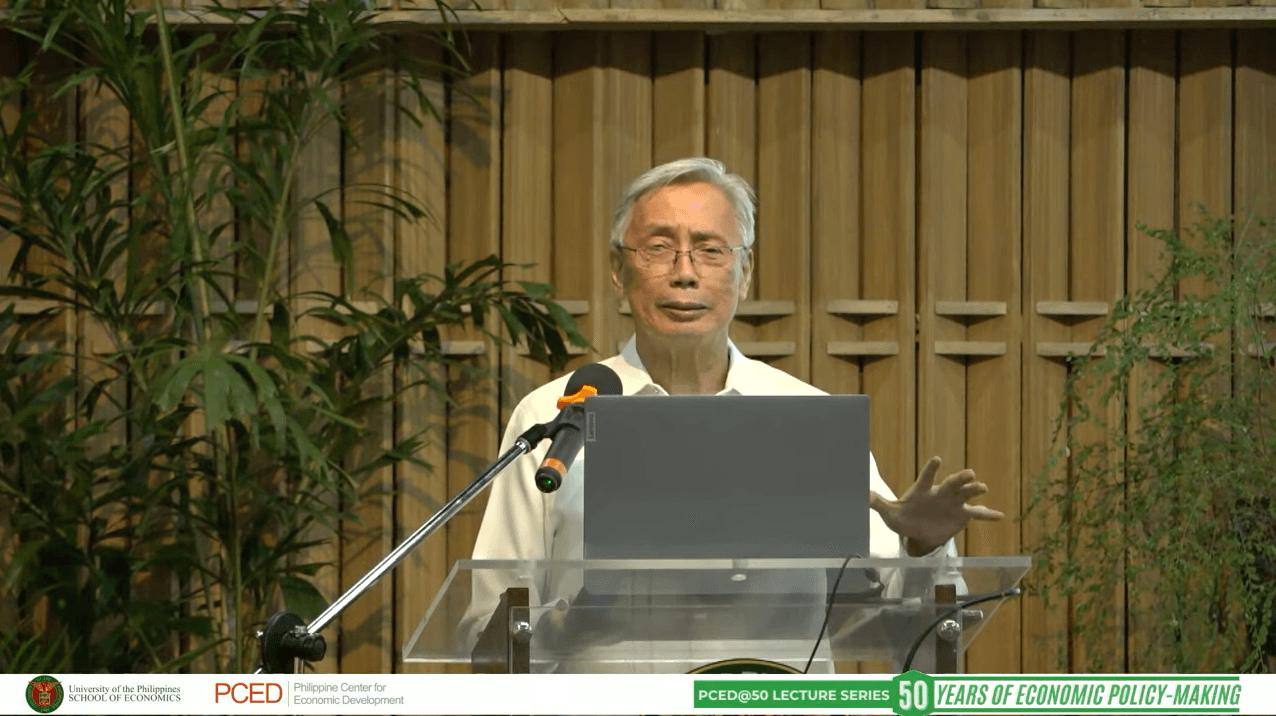SUMMARY
This is AI generated summarization, which may have errors. For context, always refer to the full article.

MANILA, Philippines – Former Philippine central bank chief Felipe Medalla admitted that he wanted out of the discussions about the contentious Maharlika Investment Fund (MIF), but eventually signed off on the measure after some tweaks.
The former Bangko Sentral ng Pilipinas (BSP) governor got candid in a forum organized by the University of the Philippines School of Economics (UPSE) on Friday, August 18, where he said that he would observe the fund’s impact on the economy once implemented.
“The law is there now. Let’s see how it can be less a danger to the Philippine economy in the future,” Medalla said.
Medalla said any funds added to the Maharlika fund entails additional borrowing.
“Anything that goes to the fund is additional borrowing because the entire country has a deficit,” Medalla explained.
The Maharlika fund is one of President Ferdinand Marcos Jr.’s major economic initiatives, which creates a strategic investment fund that injects cash not just in traditional financial instruments, but also in economic projects. It draws its capital from the national government as well as from state-run Land Bank of the Philippines and the Development Bank of the Philippines (DBP).
Medalla pointed out that Landbank and DBP are buyers of government securities.
“If they’re required to invest in the fund, there’ll be lower demand for government securities. The government has to find new lenders,” he said.
Medalla, however, eventually signed off on the measure after Congress tweaked the original proposal, including the removal of state pension funds from being invested into the Maharlika fund. (READ: [OPINION] Peddling a plunder fund)
“I spoke out that it was something that I was not in favor of. But at the same time, later on, there were a lot of changes like it is no longer primarily an asset management fund but something that will be developed for strategic investments,” Medalla said.
He added that the UPSE was not too late in speaking out against the Maharlika fund. Rather, policy-makers were “too fast” in passing the law.
“My impression was the president himself was not sold on the idea before when he was elected, but not yet in office. At that point, he was not really sold on that idea yet. So to me, the curious thing is what happened between that,” he said.
Medalla had the shortest stint as BSP governor, serving just one year, from June 2022 to July 2023. However, he served long on the BSP’s Monetary Board and was only serving the unexpired term of his predecessor, Benjamin Diokno, now the finance secretary.
‘Embarrassing’
Medalla went on to say that he was “embarrassed that one of UPSE’s “top graduates” supported the Maharlika.
“One of our top graduates was supporting Maharlika… Now I do agree that I am quite embarrassed by the way one of our top graduates was supporting Maharlika. Because of my position at that time, I wanted to stay out of the discussions. You may call me a very, very late supporter,” Medalla said, without naming the individual he was referring to.
Medalla was the first of Marcos’s economic managers who expressed reservations about the MIF.
Marcos’ economic team is led by Finance Secretary Benjamin Diokno, who earned a bachelors degree in public administration in UP Diliman in 1968, and earned his master’s degree in public administration and economics from the same university in 1970 and 1974, respectively. Diokno was a professor emeritus of UPSE.
Budget Secretary Amenah Pangandaman earned her bachelor’s degree in economics from the Far Eastern University. She holds a diploma and master’s degree in development economics from UPSE.
National Economic and Development Authority Secretary Arsenio Balisacan earned his bachelor’s degree in agriculture from Mariano Marcos State University in 1979 and graduated magna cum laude. He took up his master’s degree in agricultural economics from UP Los Baños in 1982.
Over at the legislature, the Maharlika fund was backed primarily by House Speaker Martin Romualdez, a graduate of the UP College of Law.
One of the MIF’s earliest and most vocal supporters, Marikina 2nd District Representative Stella Quimbo, earned her undergraduate degree (1991), masters degree (1993), and doctor of philosophy in economics from UPSE (2000). She was also a summa cum laude graduate of UPSE.
Other proponents were Albay 2nd District Representative Joey Salceda, who graduated cum laude from the Ateneo de Manila University. – Rappler.com
Add a comment
How does this make you feel?
![[ANALYSIS] Maharlika fund: New law, new lies](https://www.rappler.com/tachyon/2023/07/tl-mif-new-law-new-lies.jpg?fit=449%2C449)
![[EDITORIAL] Apat na taon na lang Ginoong Marcos, ‘di na puwede ang papetiks-petiks](https://www.rappler.com/tachyon/2024/07/animated-bongbong-marcos-2024-sona-day-carousel.jpg?resize=257%2C257&crop=280px%2C0px%2C720px%2C720px)
![[In This Economy] Delulunomics: Kailan magiging upper-middle income country ang Pilipinas?](https://www.rappler.com/tachyon/2024/07/in-this-economy-upper-middle-income-country.jpg?resize=257%2C257&crop=421px%2C0px%2C1080px%2C1080px)

![[EDITORIAL] Marcos Year 2: Hilong-talilong](https://www.rappler.com/tachyon/2024/07/animated-bongbong-marcos-2nd-sona-carousel.jpg?resize=257%2C257&crop=136px%2C0px%2C720px%2C720px)
![[Newspoint] A fighting presence](https://www.rappler.com/tachyon/2024/07/thought-leaders-a-fighting-presence.jpg?resize=257%2C257&crop=441px%2C0px%2C1080px%2C1080px)
There are no comments yet. Add your comment to start the conversation.